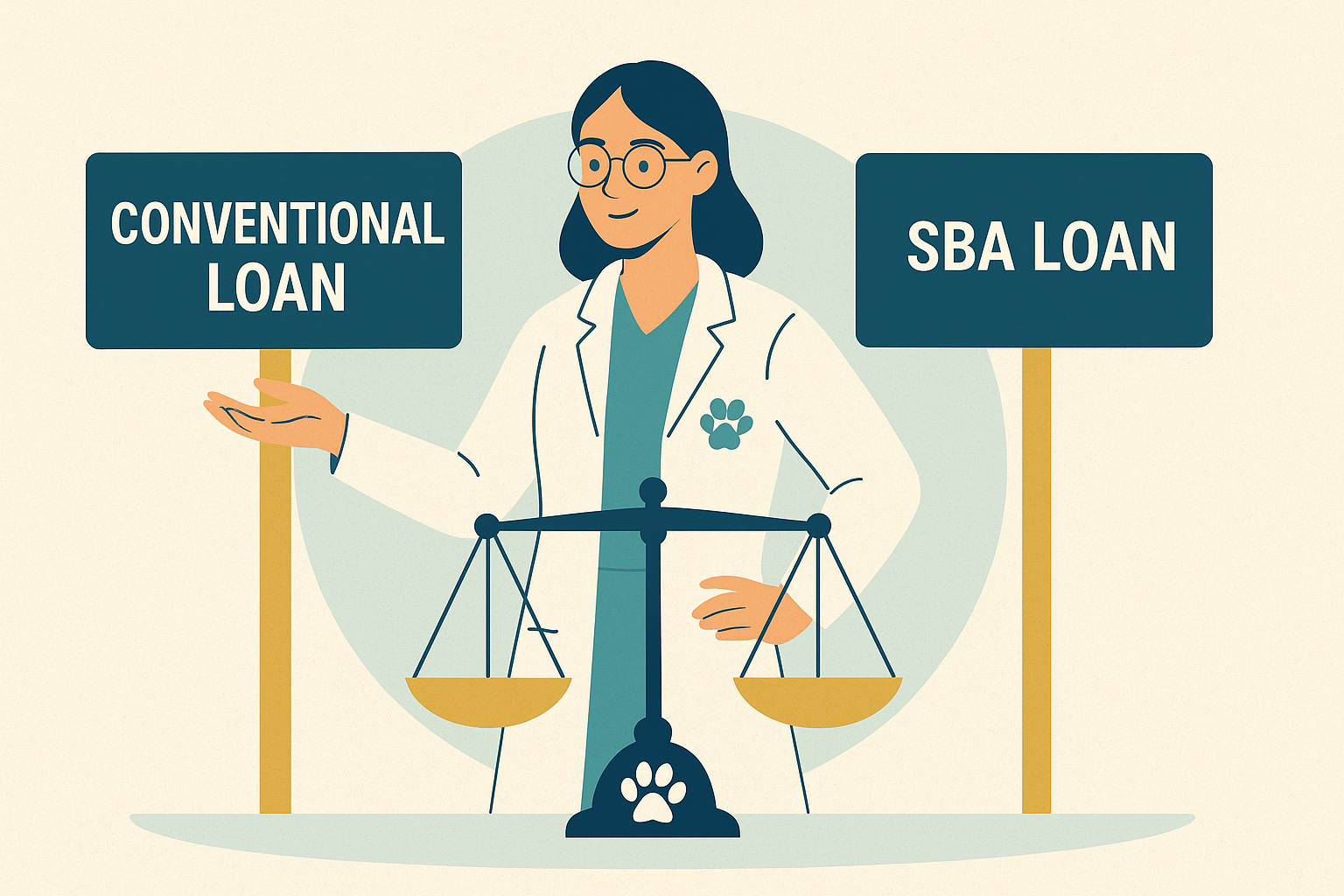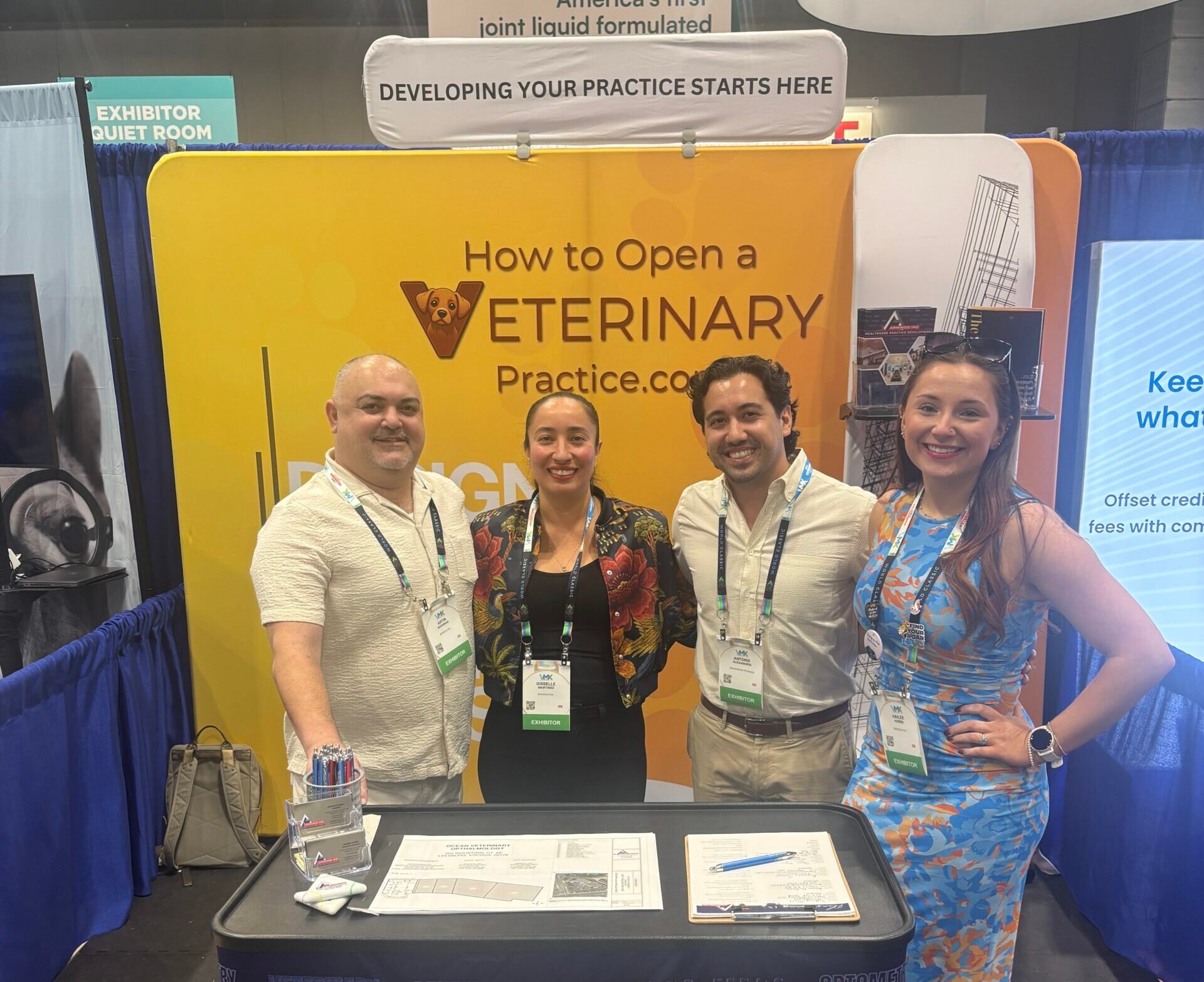
When you’re ready to finance your veterinary practice, one of the first big questions is how you’ll secure the funds. For many veterinarians, the choice often comes down to two main options: a conventional loan or a Small Business Administration (SBA) loan.
Both can get you the capital you need, but the right fit depends on your goals, financial situation, and timeline. Let’s break it down in plain English.
What is a Conventional Loan?
A conventional loan is a standard business loan issued directly by a bank or lender, without government backing. Think of it as the “traditional” path.
Key Details:
- Loan sizes: $250,000 – $5M+
- Terms: 5–10 years for equipment/working capital; up to 25 years for real estate
- Down payment: Often 10–20%
- Rates: Competitive, but usually higher than SBA
Best For:
- Veterinarians with strong credit and financial history
- Practices buying real estate or expanding quickly
- Borrowers who want fewer restrictions and faster approval
What is an SBA Loan?
An SBA loan is backed by the U.S. Small Business Administration, which guarantees a portion of the loan for the bank. This lowers the lender’s risk, making financing more accessible for small business owners.
Key Details:
- Loan sizes: $250,000 – $5M
- Terms: Up to 10 years for working capital/equipment; up to 25 years for real estate
- Down payment: As little as 10%
- Rates: Often lower, but with fees added in
Best For:
- First-time practice owners with limited collateral
- Borrowers who want longer repayment terms and lower down payments
- Practices that need flexibility with cash flow early on
What Lenders Look At
Whether you’re applying for a conventional loan or an SBA loan, lenders want to see that you’re a safe bet. They’ll typically review:
- Credit Score – Strong personal credit (often 680+ for SBA, higher for conventional).
- Business Plan – A detailed roadmap outlining and supporting the success of your practice.
- Pro Tip: Take this part seriously and don’t just meet the bank’s minimum requirement. Your business plan is the backbone of your practice. Dive deep for your own benefit.
- Cash Flow Projections – Showing how you’ll cover loan payments.
- Collateral – Business assets or personal guarantees.
- Experience – Your background in veterinary medicine and business.
Pro Tip: Feasibility Can Save You Thousands
A comprehensive project manager can support you during the feasibility stage — helping you determine your best path (ground-up build, lease, buy/own, or expansion). That clarity narrows your financing choices to the options that truly fit your vision and cash flow.
Spending a bit more on feasibility can prevent costly missteps later, often saving tens of thousands during design, construction, and build-out.
Side-by-Side Comparison
| Feature | Conventional Loan | SBA Loan |
|---|---|---|
| Who it’s best for | Established vets with strong finances | First-time owners or those needing flexibility |
| Down Payment | 10–20% | As low as 10% |
| Terms | 5–25 years (shorter for equipment) | Up to 25 years |
| Rates | Competitive, often higher than SBA | Often lower, but with added SBA fees |
| Approval Speed | Faster (usually weeks) | Slower (often 6–10+ weeks, depending on lender & package) |
| Flexibility | Fewer restrictions; lender-specific underwriting | Structured under SBA rules and eligibility requirements |
| Collateral | Strongly considered; personal guarantees common | Often required, but SBA guarantee reduces lender risk |
| Use of Funds | Broad (varies by lender) | Broad (working capital, equipment, real estate, acquisitions) |
The Bottom Line
- If you’re established, have strong credit, and want a quicker process, a conventional loan may be your best bet.
- If you’re a first-time practice owner or want lower upfront costs and longer repayment terms, an SBA loan could be the way to go.
Either way, prioritize a thorough feasibility phase and a robust business plan. Lenders love clarity — and so will future you.
Ready to explore financing for your veterinary practice?
At How to Open a Veterinary Practice, we guide you step-by-step through planning, financing, design, and build-out. Reach out today to learn how a comprehensive project manager can save you time, money, and stress on your journey to practice ownership.
Contact Us or explore our free resources to get started.



